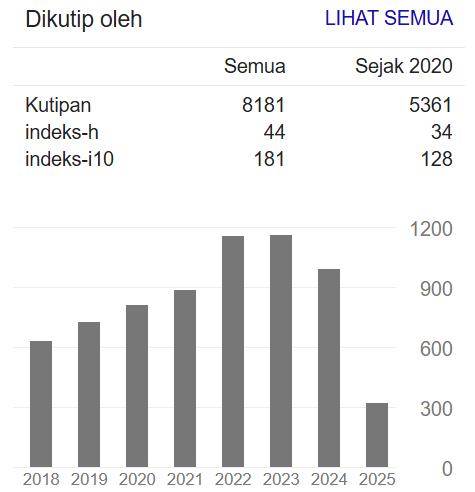EDUKASI DAN PENDAMPINGAN DAPAT MENINGKATKAN PENGETAHUAN IBU HAMIL TENTANG SELF-CARE
DOI:
https://doi.org/10.34011/jmp2k.v35i2.2972Keywords:
education, mentoring, pregnancy, self-careAbstract
Limited access to health services, such as minimal prenatal class programs, often increases health risks due to lack of adequate monitoring. In addition, low support from health workers can cause various problems, both physical and psychological, for pregnant women. Poor physical health and high levels of anxiety can have a negative impact on the health of the mother and fetus, even risking the baby being neglected and lacking breast milk. Therefore, when health worker resources are limited, empowering pregnant women becomes very important. The study aimed to analyze the effectiveness of education and assistance in increasing pregnant women's knowledge about self-care in pregnancy. This study used a quasi-experiment with a pre-posttest two group design. The population was pregnant women and the sampling technique was a purposive sampling technique. The number of samples was 60 people divided into two groups. Education and assistance were carried out for approximately 30 minutes, twice with a time span of one week. The media used was a Module. The pre-test was conducted to determine knowledge using a questionnaire. The post-test was conducted in the same way, after intervention was given to both the treatment and control groups. To see the effect of education and assistance, an independent T test was used. The results of the study showed that education and assistance were effective in increasing pregnant women's knowledge about self-care during pregnancy with a p-value of 0.000. The conclusion is that education and assistance are effective in increasing knowledge about self-care during pregnancy.
References
WHO, “WHO recommendations on self-care interventions,” Human Reproduction Programme, 2020.
I. Benediktsson, S. W. McDonald, “Comparing CenteringPregnancy® to standard prenatal care plus prenatal education,” 2013, bmcpregnancychildbirth, doi: 10.1186/1471-2393-13-S1-S5.
M. Teli, “Family Empowerment Model for Type 2 DM Management: Integration of Self care Model by Orem and Family Centered Nursing by Friedman in Sikumana Health Center-Kupang,” Jurnal Info Kesehatan, vol. 17, no. 1, 2019, doi: 10.31965/infokes.vol17.iss1.261.
N. Hapsari, S. M. Karini, and A. T. Setyanto, “Pelatihan Mindfulness untuk Menurunkan Kecemasan Ibu dengan Kehamilan Pertama Trimester III,” INSAN Jurnal Psikologi dan Kesehatan Mental, vol. 6, no. 1, p. 10, Jan. 2021, doi: 10.20473/jpkm.V6I12021.10-21.
R. Nurhasanah and M. Masluroh, “Pengaruh Pendampingan Ibu Hamil Terhadap Perilaku Perawatan Kehamilan,” Malahayati Nursing Journal, vol. 4, no. 8, 2022, doi: 10.33024/mnj.v4i8.6929.
Y. Yusnidar and I. Suriati, “Pengaruh Kelas Ibu Hamil Pada Ibu Primigravida Terhadap Pengetahuan Tentang Perawatan Kehamilan,” Jurnal JKFT, vol. 6, no. 1, p. 1, Aug. 2021, doi: 10.31000/jkft.v6i1.5208.
M. Siregar and M. Nasution, “Pengaruh Kelas ibu hamil terhadap pengetahuan dan sikap ibu tentang perawatan kehamilan, persalinan, nifas,” Jurnal Ilmiah PANNMED (Pharmacist, Analyst, Nurse, Nutrition, Midwivery, Environment, Dentist), vol. 15, no. 3, 2020, doi: 10.36911/pannmed.v15i3.810.
H. Hwang et al., “Perspectives on antenatal education associated with pregnancy outcomes: Systematic review and meta-analysis,” Women and Birth, vol. 34, no. 3, pp. 219–230, May 2021, doi: 10.1016/J.WOMBI.2020.04.002.
S. Kristianti and A. Kusmiwiyati, “Pelaksanaan Kelas Ibu Hamil Dengan Kemandirian Ibu Primipara Dalam Perawatan Neonatus Di Puskesmas Sukorame Kota Kediri,” Jurnal Ilmu Kesehatan, vol. 5, no. 2, p. 56, Jan. 2017, doi: 10.32831/jik.v5i2.135.
D. E. Yanti, A. A. Perdana, and N. O. Rina, “Health Belief Model: Selfcare Penderita Hipertensi di Wilayah Kerja UPT Puskesmas Kalirejo Kabupaten Pesawaran,” Jurnal Dunia Kesmas, vol. 9, no. 2, pp. 192–205, Oct. 2020, doi: 10.33024/jdk.v9i2.2956.
WHO, “WHO recommendations on antenatal care,” WHO Library Cataloguing, 2016.
WHO23, WHO Consolidated Guideline on Self-care Interventions for Health, vol. 23, no. 3. 2019. [Online]. Available: http://dx.doi.org/10.1016/j.ijmedinf.2011.08.007%0Ahttp://www.ncbi.nlm.nih.gov/pubmed/28348205%0Ahttp://www.pubmedcentral.nih.gov/articlerender.fcgi?artid=PMC5485755%0Ahttp://jech.bmj.com/lookup/doi/10.1136/jech-2016-208322%0Ahttp://dx.doi.org/10.1016/j.a
M. Jouanne, S. Oddoux, A. Noël, and A. S. Voisin-Chiret, “Nutrient Requirements during Pregnancy and Lactation,” Nutrients, vol. 13, no. 2, p. 692, Feb. 2021, doi: 10.3390/nu13020692.
E. M. Bayked, E. M. Yimer, T. Gelaw, A. S. Mohammed, and N. A. Mekonen, “Dietary knowledge, attitude, practice, and associated factors among pregnant mothers in Ethiopia: a systematic review and meta-analysis,” Front Public Health, vol. 12, Sep. 2024, doi: 10.3389/fpubh.2024.1393764.
D. A. Parcells, “Women’s mental health nursing: depression, anxiety and stress during pregnancy,” J Psychiatr Ment Health Nurs, 2010, doi: 10.1111/j.1365-2850.2010.01588.x.
M. Hailu, “Birth preparedness and complication readiness among pregnant women in Southern Ethiopia,” PLoS One, vol. 6, no. 6, 2011, doi: 10.1371/journal.pone.0021432.
B. Janakiraman, T. Gebreyesus, M. Yihunie, and M. G. Genet, “Knowledge, attitude, and practice of antenatal exercises among pregnant women in Ethiopia: A cross-sectional study,” PLoS One, vol. 16, no. 2, p. e0247533, Feb. 2021, doi: 10.1371/journal.pone.0247533.
T. T. Hailemariam, Y. S. Gebregiorgis, B. F. Gebremeskel, T. G. Haile, and T. M. Spitznagle, “Physical activity and associated factors among pregnant women in Ethiopia: facility-based cross-sectional study,” BMC Pregnancy Childbirth, vol. 20, no. 1, p. 92, Dec. 2020, doi: 10.1186/s12884-020-2777-6.




